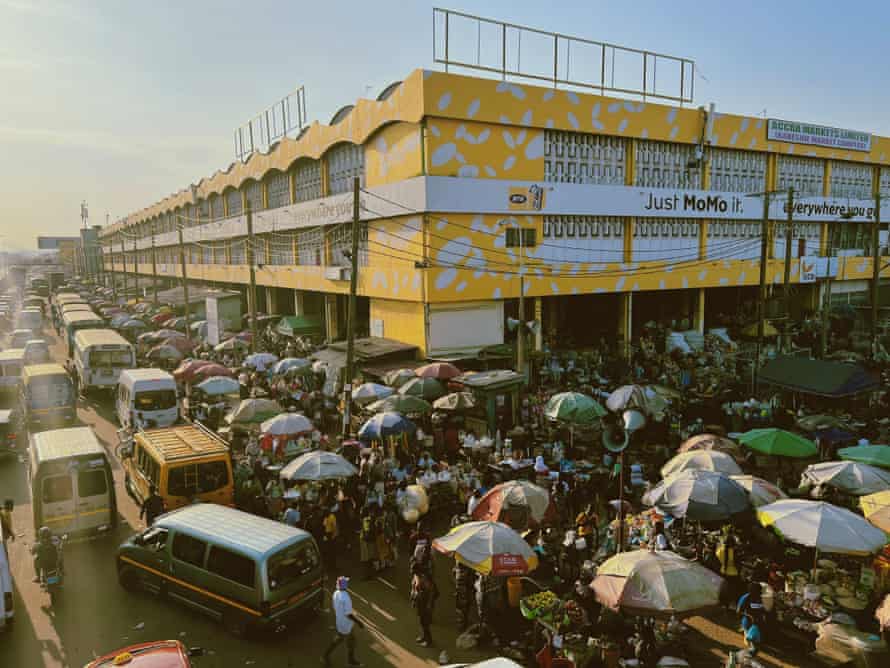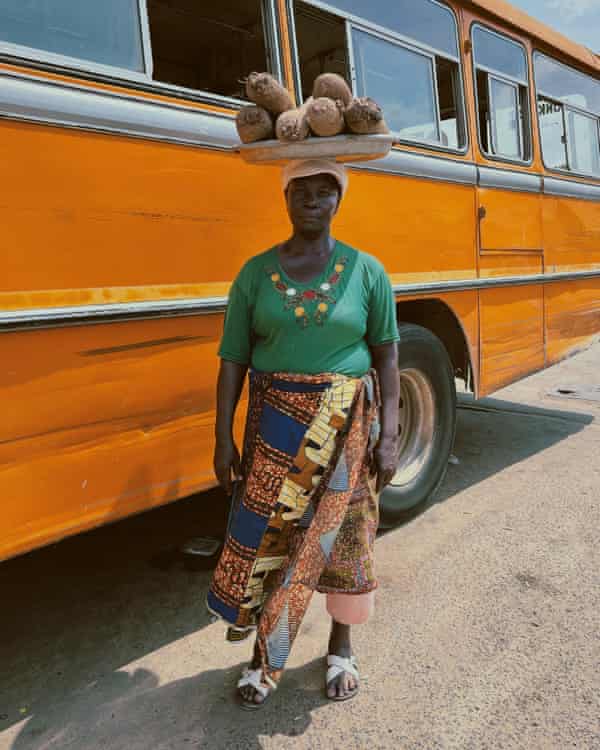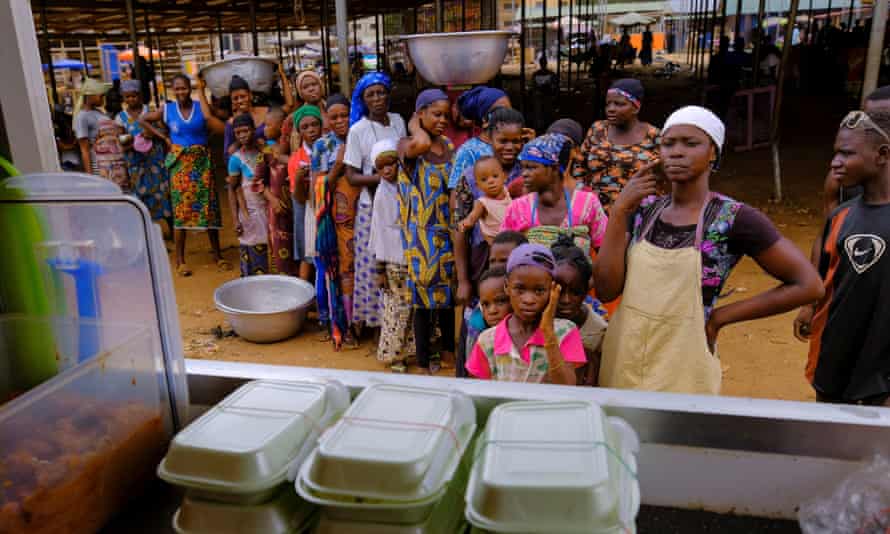On a quiet stretch amid the sprawling buzz of Kaneshie market in Accra, a group of traders sheltering under canopies from the blazing sun sell yams stacked along the roadside.
Rita Oboh, 32, has worked the spot, or one nearby, since she was six, following in the footsteps of her mother who also traded yams. “My mother lived good, really good,” Oboh says with pride. “She built houses, she looked after everybody, her family de ella, people who relied on her. She was successful.”
But now times are lean, and the life Oboh’s mother was able to build feels far out of reach. “This was a prosperous trade,” Oboh says, pointing to her yams from her. “But now everything is a struggle.”
Across Kaneshie, customers patiently scan trays of produce – bright red peppers and tomatoes, bundles of spinach, okra. Nearly all are far more expensive than they used to be. Food prices in Ghana have risen by 30% over the last year. Energy costs have also climbed sharply and inflation is running at 27%, according to the country’s statistical authorities.
As customers pick up and scrutinize their yams, Oboh and the other women – almost all the main or sole breadwinners of their homes – describe how a cost of living crisis has gripped Ghana and reshaped their lives.
“If people bought three before, now they only buy one,” says 54-year-old Felicia Appiah. “I earn 20% of what I earned five years ago.”
Not only has the price of the yams gone up, so have delivery costs and the bus fares to and from the market and home. As profits have dwindled, the women have gradually cut costs, including by eating less food.
“I used to eat three times a day, now only once,” says Oboh, her words echoed by the others. “I wait until 2pm, in the middle of the day. Then I buy a heavy double portion of banku [a cassava-based dish] with fish and two packs of water. That’s the only way I can provide for my children and make sure they eat even when I can’t.”
The crisis has heaped pressure on Ghana’s government. Officials have repeatedly stressed that the economic challenges are largely ripple effects of the war in Ukraine, which has disrupted global food chains. President Nana Akufo-Addo has stressed the war has compromised food security in Africa, echoing the concerns of other African leaders. Countries such as Ghana, heavily reliant on food imports, have been most vulnerable.
Yet many at the market lay the blame on government failings. To Appiah, the war in Ukraine is just the latest excuse. “First, a few years after they came into power, the government said there were economic struggles all over the world, then they blamed the pandemic, now it’s the Ukraine war, when we know they are the ones who have failed.”

The cost of sending money to her parents in northern Ghana has risen owing to a levy adopted by the government last month. The 1.5% tax on all electronic transactions targets the widespread use of mobile money payments, which are hugely popular in Ghana. The government has said the levy will raise 6.9bn cedis (£710m) this year, a fraction of the £39bn national debt.
The levy was in part a response to the lack of revenues Ghana was generating, according to officials. yet it has not been enough. Last week the government announced it planned formal talks with the International Monetary Fund to seek support, a situation it had previously sought to avoid. In May, Ghana’s central bank raised interest rates to 19%, following similar moves by countries such as South Africa and Egypt.

Public sympathy for the government’s financial challenges has largely diminished, amid anger at corruption scandals and the cost of some public projects. In the 2016 presidential election Akufo-Addo pledged to build a national cathedral, calling it the manifestation of a promise he had made to God and “an act of thanksgiving to the Almighty for his blessing, favour, grace and mercy on our nation.”
Designed by the renowned Ghanaian architect Sir David Adjaye, it is to be built on a 14-acre compound in Osu, an affluent part of Accra. The government says the estimated £285m cost will be paid for mainly by donors, though a recent allocation of £2.4m of state funds for the project ignited outrage.
In an interview in June with the popular broadcaster Joy News, Ghana’s minister of finance, Ken Ofori-Atta, dismissed the criticism, saying the outlay was “one one-thousandth” of government spending and that the cathedral would bring economic benefits.
But Alex, a 27-year-old delivery rider driving past the construction site, is skeptical. “I can’t understand it. How do they reason that this is the best time to pour money into a cathedral?” he says. “Ghanaians are suffering and this is what they are spending our money on?”
In a few months he plans to move to Dubai or Doha to find work. “What I earn is not sufficient for me,” he says. “I have two siblings and someone else who I care for. I have to support them.”

“I for lef Ghana”, a phrase in pidgin meaning “I want to leave Ghana”, has become ubiquitous on social media this year, a humorous and bleak expression used by young people to describe dreams of leaving the country for better prospects. “The condition of the country is so tough, so almost everyone wants to leave their lives to further,” Alex says. “Because we don’t know when things will get better.”
The government has talked up Ghana’s reputation for a sound economy and peaceful democracy, especially in contrast to other countries in the region enduring serious economic and political turmoil. But as more Ghanians feel economic pain, the messaging is wearing thin.
“Politicians sometimes talk as though we should be grateful that we are not like worse countries,” Alex says. “They’ll say ‘look what those countries are facing’, even though things are getting worse for us.”
Sign up to First Edition, our free daily newsletter – every weekday morning at 7am
At Kaneshie, Felicia says all four of her children graduated from university but only one is employed, working at a local brewery. “If I had money I would send them abroad, because there is nothing for them to do here, no opportunities,” she says.
The market traders have gradually incurred debts to buy wholesale produce, and the women have come to rely on each other for support, hoping things will improve soon.
“I pray that things will get better,” Felicia says. “But for now I’m not convinced.”
www.theguardian.com
George is Digismak’s reported cum editor with 13 years of experience in Journalism